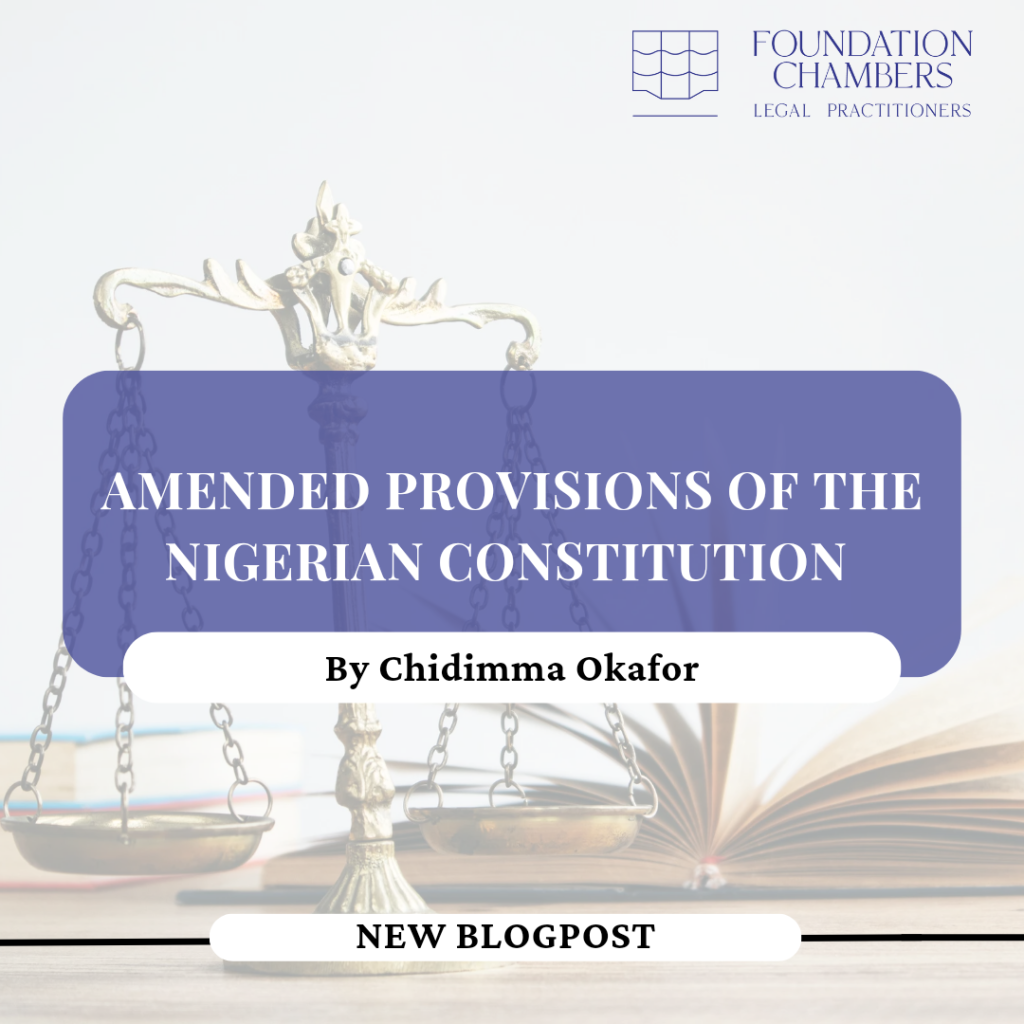AMENDED PROVISIONS OF THE NIGERIAN CONSTITUTION
In January 2023, the Ninth National Assembly, in compliance with Section 9 of the Constitution of the Federal Republic of Nigeria, submitted about 35 Constitutional Amendments Bills to the President for assent. Consequently, on the 17th day of March 2023, the President assented to only 19 bills. This, among other things, is the 5th Constitutional Alteration of the Constitution since 1999.
In this Blogpost, we address three (3) crucial areas that were addressed in the Alterations, namely, the delegation of powers to States, maters on governance and matters on the Judiciary.
A. DELEGATION OF POWERS TO STATES
1.The financial independence of State Houses of Assembly and State Judiciary
The new provision under the Alteration Act No. 8, is a welcomed development for States’ legislative Houses and judicial Arms as it enables these Arms to perform their duties without unnecessary monetary hindrances and protocols. The Judiciary is saddled with the major responsibility to administer justice and thus, it is expected not to be dependent on any other Arm for funding. The reason for this is that justice must be served without fear or favour. Thus, to achieve an impartial dispensation of justice, each Arm of the Government should enjoy financial autonomy.
2.The removal of the item “Prisons” in the Exclusive Legislative List and redesignating it as “Correctional Services” in the Concurrent Legislative List.
Issues of dilapidated prison structures, congestion, a high number of awaiting trial inmates and other related matters, have been of concern to many, and ultimately the recent Kuje Prison break and other breakouts in the country have left so many questions unanswered.[1]
Currently, the Alteration Act No. 15 provides that State offenders will go to State prisons while Federal offenders to Federal prisons, thus States will now have the power to establish Correctional and Custodial facilities, and State Assemblies will have the power to legislate over them.[2] Hence, States can now make policies, fund State Correctional and Custodial facilities, and give necessary directions in that regard.
3. The removal of the item “Railways” from the Exclusive Legislative List to the Concurrent Legislative List; and for related matters.
The railway constitutional amendment bill was largely pushed forward by Abia-North lawmakers via the fifth alteration to the Constitution aimed at boosting the nation’s transport system.[3] The Alteration Act No.16 provides that States can now build their rail tracks, introduce trains for intra-State transport among others to decongest their roads, invest in their infrastructures and make State policies in that regard.[4] This will undoubtedly enhance open checks and balances, reduce protocols for signatories and aid in the reduction of logjams in the transportation system in Nigeria.
4. The permission for States to generate, transmit and distribute electricity in areas covered by the national grid; and for related matters.
Before the amendment, the Constitution provided that State Houses of Assembly could only make laws for their respective States regarding electricity and the establishment of electric power stations, the generation, transmission and distribution of electricity to areas not covered by a national grid system within that State and the establishment within that State of any authority for the promotion and management of electric power stations established by the State.
However, Alteration Act No. 17 has expanded the scope to include the generation, distribution, and transmission of electricity without limiting the scope of coverage to areas not covered by the national grid. This is to the effect that the various States can now generate, transmit and distribute electricity to cover areas already connected to the national grid.[5] Hence, this is a significant amendment as it decentralises electricity regulation in areas already covered by the national grid.
B. MATTERS ON GOVERNANCE
5. The provision to regulate the first session and inauguration of members-elect of the National and State Houses of Assembly; and for related matters.
Before now, there has been a vacuum as to the difference between the quorum for the inauguration and the first session of the legislative house. However, the Alteration Act No. 8 has altered Sections 54, and 96 of the Constitution of the Federal Republic of Nigeria, 1999 and stated that there must be a quorum of at least two-thirds of members-elect for the inauguration or first sitting of the House and at the State level at least, two-thirds of all members.[6]
Also, it addressed the issue of Standing Orders[7] by amending section 311 (2) – (5) of the Constitution to the effect that it is the existing Standing Order made before the dissolution of a legislative house that will apply to the inauguration and proceedings of the first session of a House.
6. The requirement of the President and Governors to submit the names of persons nominated as Ministers or Commissioners within sixty days of taking the oath of office for confirmation by the Senate or State House of Assembly; and for related matters.
Before now, there was no timeframe as to when the names of nominated ministers and commissioners are to be submitted for confirmation by the Senate. However, under Alteration No. 23, the President and the Governors have been mandated to submit the names of the nominees to the Senate and State House of Assembly respectively within sixty days of taking the oath of office for confirmation. This will fill in the space of laxity and delay, thus, it is considered as a good addition to the Constitution.
7. The provision for the Government to direct its policy towards ensuring the right to food and food security in Nigeria; and for related matters.
Alteration Act No. 34 directs the Government to ensure that part of its policies is towards the right to food and food security as against the earlier words used under Section 16 (1)(b) of the Constitution ‘suitable and adequate’.
C. MATTERS ON THE JUDICIARY
8. The Provision to delete the reference of the Criminal Code, Penal Code, Criminal Procedure Act, Criminal Procedure Code or Evidence Act; and for related matters.
Alteration Act No.9 deletes in entirety any reference to the provisions of the Criminal Code, Penal Code, Criminal Procedure Act, Criminal Code or Evidence Act in the Constitution.[8] Also, it justifies the sole civil jurisdiction of the National Industrial Court, by deleting the confusion caused by the provision of Section 254 (2) of the Constitution, which states that ‘…For the purpose of exercising its criminal jurisdiction, the provisions of the Criminal Code, Penal Code, Criminal Procedure Act, Criminal Procedure Code or Evidence Act shall apply.’
Hence with the Alteration, the jurisdiction of the National Industrial Court is now lucid and clear that it does not exercise criminal jurisdiction over matters.
9. The provision to exclude the period of intervening events in the computation of time for determining pre-election petitions, election petitions and appeals; and for related matters.
Alteration Act No.10 provides for a swift determination of pre-election petitions, election petitions, appeals and related matters without the judiciary allowing the intervening events to be included in the computation of the time.
10. The provision to provide for the post-call qualification of the Secretary of the National Judicial Council (NJC); and for related matters.
Alteration Act No.12 has mellowed down the issue of the required post-call qualification of the National Judicial Council Secretary. The NJC guidelines stipulated 10 years post-call. However, with the current amendment, this has been discarded, hence, any person to be appointed a secretary by the Council must be a legal practitioner of at least 15 years post-call.[9]
CONCLUSION
These alterations to the Constitution have had significant impacts on the Nigerian political landscape and governance structure and together they represent significant changes to the legal framework of Nigeria. It is believed that the amendments will ensure the promotion of true federalism and strengthen the various Arms of Government.
[1] Udora Orizu, ‘Prison Decongestion in Sight as Items moves to Concurrent List’ https://www.thisdaylive.com/index.php/2023/04/04/prison-decongestion-in-sight-as-item-moves-to-concurrent-list/ accessed at 12th May, 2023.
[2] ibid
[3]The Sun Newspaper,https://sunnewsonline.com/his-bill-to-empower-states-to-build-railways-gets-presidential-assent/ accessed at 22nd April, 2023.
[4] ibid
[5] <National Assembly Votes Sixty-Eight Alteration Bills- > Policy and Legal Advocacy Centre. (Accessed 4th May, 2023)
[6] Sections 2 and 3 of the Constitution of the Federal Republic of Nigeria, 1999 (Fifth Alteration) Act No. 8
[7] Rules which regulate the proceedings of the legislative arm.
[8] The Constitution of the Federal Republic of Nigeria- (Third Alteration Ac), No. 3, 2011
[9] Section 2 of the Constitution of the Federal Republic of Nigeria, (Fifth Alteration) No. 10, 2023


